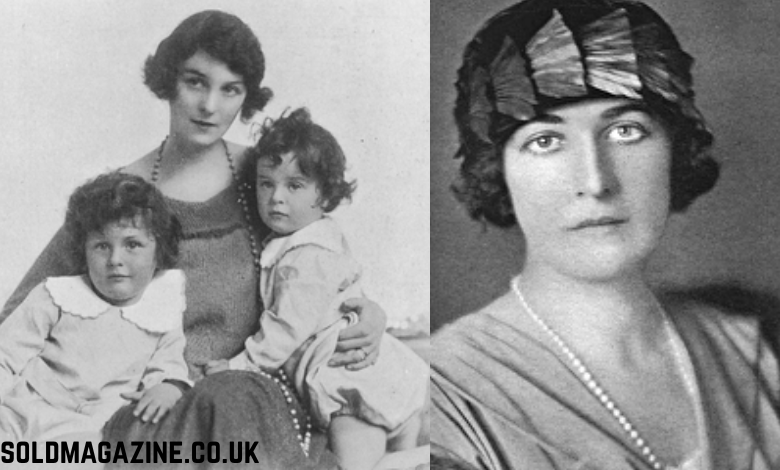Introduction
In the grand halls of Edwardian Britain, a time when aristocracy and politics shaped the fate of nations, few individuals had the chance to influence history in profound yet private ways. One such person, whose role in shaping events is often overlooked, was Venetia Stanley. A name not widely recognized outside of historical circles, Venetia was an essential figure in the life of Prime Minister H.H. Asquith, especially during a critical time for Britain — the years leading up to and during the First World War.
Early Life: A Privileged Beginning
Born Beatrice Venetia Stanley on August 22, 1887, Venetia was the youngest daughter of Edward Lyulph Stanley, the 4th Baron Sheffield, and Mary Katherine Bell. Raised in an aristocratic family, she was surrounded by privilege and educated in the finest traditions of British society. Her upbringing afforded her opportunities for intellectual and cultural development, and she grew up in an environment that fostered curiosity and sophistication.
Venetia’s family, being part of the British elite, was well connected to the political, intellectual, and cultural circles of the time. Growing up, she had access to influential people and learned the intricacies of British high society. This exposure to the country’s political and intellectual spheres would later play a significant role in her connection to one of the most powerful political figures of the time.
The Relationship with H.H. Asquith
Venetia Stanley’s influence on British politics began not through public office or societal leadership but through a private, personal connection with one of the country’s most important figures: Prime Minister H.H. Asquith.
Her relationship with Asquith began in the early 1900s, and over time, it grew into a deeply personal and emotional bond, largely carried out through written correspondence. While Asquith was busy leading the country through a rapidly changing political landscape, Venetia served as a quiet yet important confidante, offering him a place to express his fears, frustrations, and doubts.
Asquith, whose tenure as Prime Minister lasted from 1908 to 1916, was facing immense personal and political pressures. His wife, Margot Asquith, had a complicated relationship with him, and Asquith’s responsibilities in managing the affairs of the nation left him little room to share his personal burdens. This is where Venetia Stanley’s role became invaluable.
Through their letters, Venetia became Asquith’s emotional anchor. The correspondence began as exchanges about more trivial matters, but as the years went by, it deepened, touching on more personal and sensitive issues. Venetia, in turn, offered support, understanding, and advice — something Asquith needed during such a turbulent time.
The Letters: A Glimpse into Asquith’s Mind
The letters between Venetia and Asquith provide us with a rare glimpse into the mind of a Prime Minister struggling with personal and national crises. Asquith was in the midst of overseeing Britain’s entry into World War I, dealing with mounting political pressure, and managing the national morale. At the same time, his own personal life was unraveling. His son Raymond was killed in the war, and the emotional weight of this loss took a heavy toll on him.
In these letters, Asquith did not simply discuss political matters or strategies; he shared his innermost thoughts about life, death, and the future of the nation. The Prime Minister’s vulnerability is revealed in these private writings. He confided in Venetia about his anxieties over the war and the uncertainty of Britain’s future, showing a side of himself that few, if any, saw.
One letter, in particular, stands out. Asquith wrote: “No words can capture the depth of my sorrow. I feel as though I have lost not just my son, but a part of myself.” Venetia responded with empathy and understanding, offering him comfort and advice during one of the most painful times in his life.
Through their correspondence, we also see the weight of leadership on Asquith’s shoulders. His letters reflect a man torn between his duty to the nation and his personal grief. The letters were not merely an exchange of words but a vital source of emotional support for Asquith during his darkest hours.
Venetia Stanley’s Role During the War
As World War I raged on, Asquith’s leadership was increasingly scrutinized. The war created immense pressure for those at the helm of Britain’s government, and Asquith was no exception. His inability to fully manage the war effort led to criticism, and in 1916, Asquith was forced to resign as Prime Minister.
This period of transition marked the end of Asquith’s political career and, in some ways, signaled the waning of his relationship with Venetia. However, during this time, Venetia’s support remained a constant for Asquith. She continued to provide a comforting presence through her letters, offering solace during the tough political and personal decisions Asquith had to make.
While Venetia’s personal role in Asquith’s life may have decreased after his resignation, her influence during the earlier years was significant. She provided him with a space to express his emotions, seek guidance, and share his personal sorrow — an outlet that few other people in Asquith’s life could offer.
The Legacy of Venetia Stanley
Venetia Stanley’s role in British history is often overshadowed by more public figures, but her contributions are no less important. Through her private correspondence with H.H. Asquith, she became an essential figure in the personal life of one of the country’s most powerful leaders. She was not a political figure, but her support and influence were felt in ways that extended far beyond the private realm.
Her legacy is seen in the letters she wrote, which now serve as an invaluable resource for historians seeking to understand the emotional and personal challenges of political leaders during a time of war. Venetia’s correspondence with Asquith offers a rare look into the complexities of leadership, personal loss, and the private struggles that often shape public decisions.
Venetia Stanley’s story serves as a reminder of the often-overlooked figures in history who, through their quiet support, play a critical role in shaping the lives of those who lead. Her influence was felt at a time when Britain was on the brink of change, and her letters remain a testament to the power of human connection in times of crisis.
Conclusion
In conclusion, Venetia Stanley’s private correspondence with H.H. Asquith is a profound and unique part of British history. Though not a public figure, her influence on Asquith during one of the most critical periods in British history was significant. Through her emotional support and candid advice, Venetia helped guide Asquith through personal turmoil and political pressure, offering a rare glimpse into the human side of leadership. Her letters continue to provide valuable insights into the emotional and political challenges of the First World War era, making Venetia Stanley’s legacy an important yet often overlooked aspect of history.
FAQS
1. Who was Venetia Stanley?
Venetia Stanley was an aristocratic British woman who became a confidante to Prime Minister H.H. Asquith during World War I.
2. How did Venetia Stanley influence H.H. Asquith?
Through intimate correspondence, Venetia provided emotional support to Asquith, offering him solace during personal and political crises.
3. What was the relationship between Venetia Stanley and Asquith?
Venetia and Asquith shared a deep, private relationship through letters, with Venetia becoming a trusted confidante and advisor.
4. Why is Venetia Stanley significant in British history?
Venetia played a pivotal role in Asquith’s personal life, offering guidance during a critical time for both Britain and its leadership.
5. What are Venetia Stanley’s contributions to historical records?
Her letters to H.H. Asquith provide invaluable insights into the emotional and political struggles of early 20th-century British leadership.




